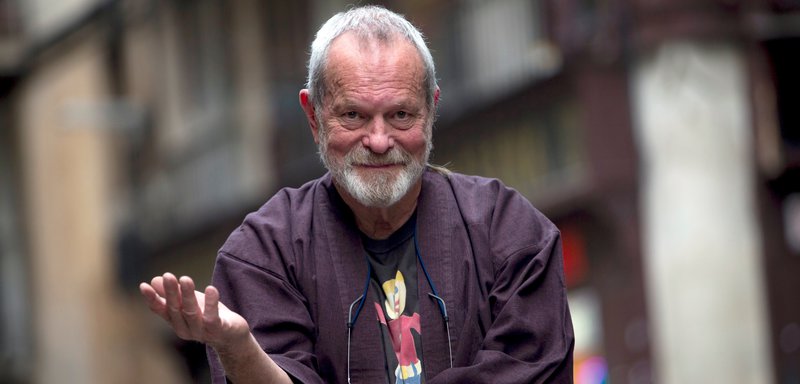Gilliam’s universe
The director of ‘Brazil’ and ‘12 Monkeys’ and erstwhile member of Monty Python has an almost complete retrospective of his work on at the Filmoteca de Catalunya until April 27
Terry Gilliam is a quixotic visionary. That is according to a retrospective the Filmoteca de Catalunya is devoting to the filmmaker until April 27. The exhibition holds baroque imaginative worlds inhabited by characters in pursuit of their dreams, as he himself spent 30 years chasing down his own dream to make a film about Don Quixote. You would not expect someone who makes films like that to be a dour stereotype. And he is not, as the two score journalists who turned out to hear him speak at the Filmoteca for the presentation will agree. Gilliam was full of humour and irony, and provided brilliant reflections on film and the modern world, as well as revelatory comments that helped shed light on his work.
“It’s been almost 30 years since I began the Quixote project,” he began, “and I spent 20 looking for locations in Spain. I was looking for popular festivals and one of the most memorable I found was close to here, the Patum.”
That the name of the retrospective should be A quixotic visionary seemed right to Gilliam: “As Cervantes said, there are critical moments and moments when dreams fail. To make a film about Quixote you need to be a little quixotic. Cervantes also wrote that dreams and hopes often end in disaster, but I’m happy to have survived, unlike what happened to Don Quixote,” he said.
“It’s better not to let Don Quixote enter your life, because once inside, there’s no getting rid of him,” Gilliam added, and he recalled what Tony Grisoni, the co-writer of The Man Who Killed Don Quixote, told him: “You’re not Quixote, you’re more like Sancho Panza.”
Gilliam attended two screenings during his visit: the documentary Lost in La Mancha, by Keith Fulton and Louis Pepe, which follows his frustrated attempts to film The Man Who Killed Don Quixote. And the next day, Teresa Font, who put together The Man Who Killed Don Quixote, gave a master class on Gilliam, followed by a screening of his film starring Bruce Willis, 12 Monkeys (1995), which the filmmaker also attended.
Gilliam took questions from journalists during the presentation. “I don’t watch my films once they’re finished, maybe I’ll have another look when I’m on my deathbed,” he confessed. He also spoke about some of the main elements of his films: “One feature is that there are characters who do not accept the limits of reality as defined by the media.” And, half jokingly, he related a comment from his wife: “She accuses me of making the same film over and over; she says all I do is change the costumes.” Meanwhile, he confirmed that imagination is central to his films, calling it “essential to survive in the world.”
In fact, Gilliam attributed his fervent imagination to the environment he grew up in: “As a child, I lived submerged in two different worlds, the countryside and the radio, which was my only outside influence, and I only had sound, the rest you had to invent. Nature, radio and also books were my influences. I’m very happy about that, as it’s where my optimism and my ability to marvel at the world came from.”
However, Gilliam revealed himself to be quite pessimistic about the current US film industry: “Films have to cost under $10 million or over a $100 million. It’s a shame. Either you make a film about three people in a kitchen, or you have to take on the whole universe, and I like to be somewhere in the middle.” Nor is he optimistic about humanity: “It’s now impossible to satirise the world, it’s the strangest and most dangerous thing I’ve ever seen. How can you satirise an extreme figure like Donald Trump?”
film

